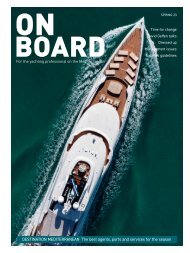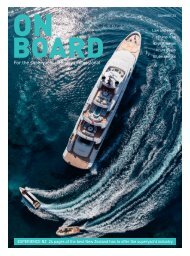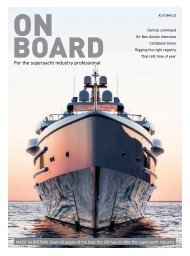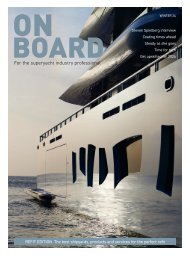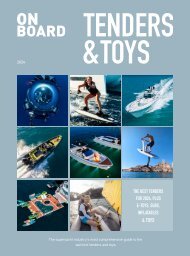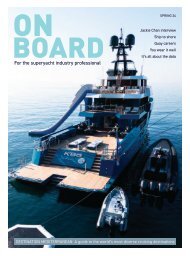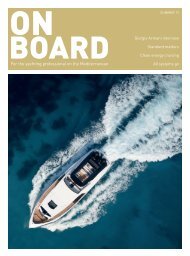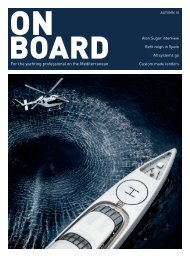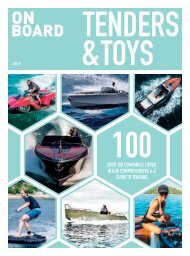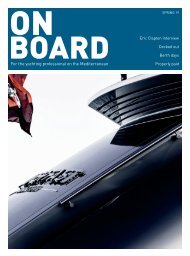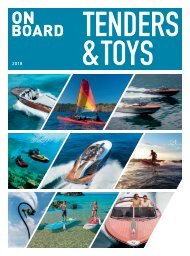ONBOARD Magazine summer 2021
The magazine is published quarterly and is the only publication aimed purely at the superyacht professional on the Mediterranean. Produced here on the Côte d’Azur, ONBOARD is a B2B industry magazine with a consumer feel. Designed to be entertaining and informative in equal balance, ONBOARD is packed with varied articles on superyacht paint & coatings, crew training, essential refit services, crew uniforms, shipyards, the very best superyacht chase boats, product launches and features from leading industry experts on relevant superyacht matters. If you need to get your products and services in front of the right crew and industry buyers, then talk to us.
The magazine is published quarterly and is the only publication aimed purely at the superyacht professional on the Mediterranean. Produced here on the Côte d’Azur, ONBOARD is a B2B industry magazine with a consumer feel. Designed to be entertaining and informative in equal balance, ONBOARD is packed with varied articles on superyacht paint & coatings, crew training, essential refit services, crew uniforms, shipyards, the very best superyacht chase boats, product launches and features from leading industry experts on relevant superyacht matters.
If you need to get your products and services in front of the right crew and industry buyers, then talk to us.
Create successful ePaper yourself
Turn your PDF publications into a flip-book with our unique Google optimized e-Paper software.
DECKING
When fixed deck furniture is removed
or repositioned during a refit, holes in
synthetic decking can be filled and sanded
to make it appear as good as new
from the weathering process that turns natural teak that silver
grey colour beloved by many yet hated by an equal number.
Because the company is based in Indonesia it has a constant and
fully traceable supply of teak and, says Peter, “There are many
major differences between one product and the other. Teak is a
finite source and very few people want to invest in the planting
of new teak given that it takes between 30 and 50 years for
each tree to mature enough for harvesting.”
Teak is only grown successfully on a large scale in Indonesia or
Myanmar (Burma). Peter affirms that, “Teak said to have been
grown in China, Malaysia, or Thailand is more often than not in
fact smuggled from Myanmar and illegally transhipped across
borders because there is no large scale, industrial teak growing
in those countries.” He adds, “In Indonesia all teak comes from
plantations. There are no and never have been areas of wild
growing teak in that country and that most of the plantations
were established more than 200 years ago.”
PUT A CORK IN IT
Yet another natural alternative to teak is cork, a product gaining a
strong foothold in the superyacht deck market. Dominique Radier
is the CEO of Aegir Cork Group SAS a company headquartered in
Nouvelle-Aquitaine, France. His company produces SeaCork. The
company has been making cork decking for 20 years now and is
developing a product called Cork Spray to insulate hulls and stop
condensation forming inside boats and yachts. “There are many
CORK DECKING
Cork is comfortable to walk on barefoot. It never gets hot. And
looks are deceiving. Cork is soft and spongy but it is also one of
the most durable materials known to man. It doesn’t rot and isn’t
harmed by salt water or by everyday cleaning products. When
wet it has unmatched anti-slip properties. Cork’s natural colour
is stunning and you can sand it every few years to make it look
new. It costs the same as teak or PVC and lasts longer than either.
Their first cork decks, now 20 years old, are still in place and don’t
show their age.
For more details Tel:+33 (0)5 58 52 32 01
or visit www.seacork.com
advantages to be gained by using cork as a teak substitute,”
he says. “First among these is the fact that no trees are felled
during the harvesting of his raw product. In today’s eco friendly
world that is a big plus!”
“It is also,” he maintains, “infinitely less slippery than teak when
wet.” He adds another is weight saving. “Teak can be heavy and
using it on the uppermost decks can have adverse effects on
stability. Cork is light weight by comparison.” Dominique believes
owners are demanding green, eco friendly yet durable products
when it comes to decking material. He understands why the use
of teak is considered to be, somewhat anti-social but is confused
by the trend towards plastic decking as an alternative. He says,
“Surely if we use plastic we know that fine particles of plastic are
harmful to the sea and fish but we used more and more plastic
decking actually”. He asks the question. “What happens when
we walk on those decks?” He answers himself saying, “Small
plastic particles must go directly into the sea, and for me that
is a good enough reason not to use it?
HOT UNDERFOOT
Many complain that synthetic decks are unsuitable for use in
the Mediterranean as they get too hot in the sun. While some
manufacturers have pale colours to help overcome this, many
owners and their guests complain that they still get unacceptably
hot. The feeling among purists is that a genuine teak maintains
an acceptable temperature on the surface while suggesting
that some synthetic decks can become so hot that in some
ONBOARD | SUMMER 2021 | 135



